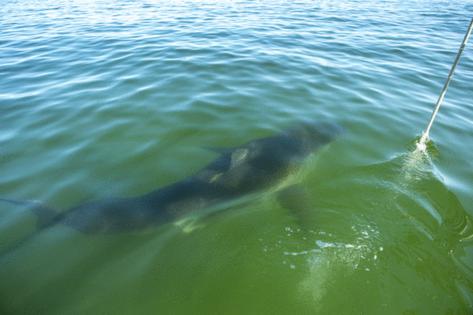Shark researchers show what could happen to Cape Cod if great whites disappear
Published in Science & Technology News
What would happen if great white sharks disappear from Cape Cod?
A new shark study shows the potential “ecosystem consequences” when the apex predator is no longer in a region, as a leading shark researcher stresses that great whites are keeping balance in the local ecosystem.
Shark scientists have zeroed in on South Africa over recent years amid the decline and eventual disappearance of white sharks from False Bay — the previous epicenter of great whites leaping out of the water for seals.
Researchers discovered that after the loss of white sharks from False Bay, both seals and a different shark species took over.
Meanwhile, more seals have been feasting more on small fish — leading to a decline in small fish across the region. And with the rise of the different shark species, sevengill sharks, there has been a drop in the smaller sharks that sevengills prey upon.
“There are a lot of lessons to learn here, and there are definitely implications for areas like Cape Cod,” Neil Hammerschlag, the executive director of the Shark Research Foundation, told the Herald.
“A lot of people are concerned about seals overpopulating places and eating fish,” the researcher said. “We see here the major changes when white sharks vanish, with seals increasing in numbers and changing their behavior… Sharks help keep it all in balance. Some people look at great whites and see them as a danger, but in fact they’re the guardians. They keep it all in check.”
The study shows the critical role that white sharks play in keeping marine ecosystems healthy, underscoring the need for their conservation, Hammerschlag added.
The researchers have been closely following great white sharks in False Bay for more than 20 years. The South African region used to be among the largest white shark aggregation sites in the world.
“It’s where great whites would jump out of the water, going after seals,” Hammerschlag said. “We would see several attacks a day. It was an extraordinary opportunity, and there was nothing like it in the world.”
But then in the 2010s, the number of great whites there started going down until they completely vanished from the region by 2018.
While the exact reason behind the loss of white sharks from False Bay is unclear, there have been numerous threats — including unsustainable captures and beach nets likely taking a major toll on the population.
Also, there have been instances of shark-eating orcas killing white sharks elsewhere along the coastline, likely contributing to the population drop.
“This rapid decline and subsequent loss of white sharks from False Bay coincided with rapid behavioral and physiological response in their prey, Cape fur seals, including reductions in seal stress levels and increasing seal rafting distances from Seal Island, a behavior that would have rendered seals vulnerable to shark attack,” the shark study reads.
“The loss of white sharks from False Bay also coincided with the novel emergence of sevengill sharks,” the study adds. “Historically, this large-bodied shark would have been an important prey of and competitor with white sharks in False Bay.”
Then researchers discovered the local food web changes with seals and sevengill sharks taking over. The scientists noticed a drop in their prey, such as small pelagic fishes in the case of seals and smaller benthic sharks in the case of sevengill sharks.
“There was a cascade of ecosystem consequences,” Hammerschlag said. “It was a completely different ecosystem, and you would have never known it had been home to great white sharks.”
________
©2025 MediaNews Group, Inc. Visit at bostonherald.com. Distributed by Tribune Content Agency, LLC.







Comments